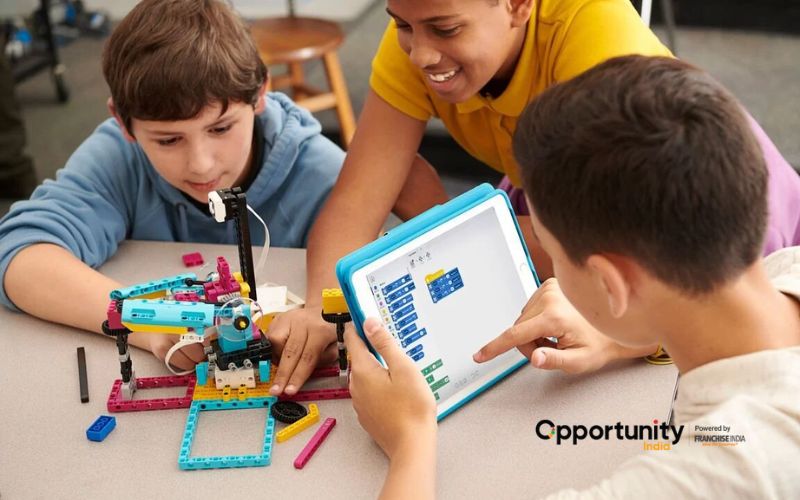
Introduction
Education in India is changing quickly. Today’s students need more than just knowledge from books, they need practical skills that will help them succeed in the future. That's why STEM (Science, Technology, Engineering, and Mathematics), robotics, and coding are becoming extremely popular. These subjects enable children to think, solve problems, and learn about technology.
Since more schools and parents are searching for such programs, opening a STEM, robotics, or coding franchise is a good business venture. It's an opportunity to make money while teaching children valuable skills for the jobs of the future.
What Is STEM, Robotics, and Coding Education?
STEM education involves the learning of Science, Technology, Engineering, and Mathematics through practical means. Rather than reading from books, students conduct experiments, make models, and solve actual problems.
Robotics education instructs students on how to design and construct robots. They learn about machines and how to operate them by making use of sensors and motors.
Coding education teaches students computer programming. They code to design games, apps, websites, and even operate robots.
These subjects collectively prepare children to be innovative thinkers, problem solvers, and future innovators. They also make learning fun and useful.
The Rise of STEM, Robotics, and Coding Education in India
1. Changing Educational Needs
Students today require more than textbook learning. Employers require candidates with problem-solving skills, creativity, and technological literacy. STEM education, coupled with coding and robotics, allows students to hone these skills from an early age.
2. Hands-On Learning
Coding and robotics classes provide activity-based learning, where students create, test, and solve practical problems. This method makes learning enjoyable and efficient, allowing students to remember concepts better.
3. Parental Awareness
Parents are increasingly aware of the importance of future-ready skills. They want their children to learn coding, robotics, and AI—not just for academic success but to prepare for careers in a tech-driven world.
Why Invest in a STEM Franchise?

1. Tried and Tested Business Model
Franchises such as Junior Engineers, Mechatron Robotics, and SP Robotics Maker Lab provide turnkey business models that have training, curriculum, and support for marketing.
2. Low Risk, High Demand
With growing demand from schools and parents, STEM franchises provide a low-investment, high-return option. The startup cost is low, and return on investment (ROI) is usually realized within 6–12 months.
3. Scalable Growth
Multiple locations can be grown by franchisees, online classes can be provided, or schools can be tied up to establish labs. The company is very scalable.
Top STEM Franchise Brands in India
1. Junior Engineers
- Founded: 2010
- Specialties: LEGO Robotics, AI, coding, 3D printing
- Reach: 100+ centers in India
- Investment: ₹3–7 lakhs
- USP: Strong curriculum, school tie-ups, and franchisee support
2. Mechatron Robotics
- Founded: 2018
- Specialties: Robotics, AI, IoT, coding, Arduino
- Reach: 20+ franchises in India and overseas
- Investment: ₹2–5 lakhs
- USP: Project-based learning, industrial-grade kits, and global presence
3. SP Robotics Maker Lab
- Founded: 2012
- Specialties: Robotics, drones, IoT, VR
- Reach: 50+ labs in 27 cities
- Investment: ₹15 lakhs
- USP: Trainerless digital model, strong branding, and community engagement
4. IndiaFIRST Robotics
- Founded: 2009
- Specialties: STEM kits, robotics training, coding
- Reach: 120+ centers in India, Middle East, and Africa
- Investment: ₹3–5 lakhs
- USP: Hands-on learning, school partnerships, and long-lasting kits
Target Market for STEM Franchises
-
Metro Cities
Metro cities like Mumbai, Delhi, Bengaluru, Hyderabad have high-tech-savvy parent density and schools willing to innovate.
-
Tier 2 and Tier 3 Cities
Ahmedabad, Indore and Coimbatore are new markets where demand for skill-based learning is expanding.
-
School Partnerships
Schools can be connected with to open STEM labs, offer after-school courses or offer workshops.
Steps to Start Your STEM Franchise
- Research Brands: Research franchise models, curriculum, and support systems.
- Evaluate Market: Understand local demand, competition, and school infrastructure.
- Secure Funding: Investment is usually between ₹3–15 lakhs based on the brand.
- Choose Location: A 300–1000 sq. ft. space is best suited for setting a lab.
- Get Trained: Staff training and curriculum delivery is done by franchisors.
- Launch Programs: Provide age-specific courses from basic robotics to advanced AI.
- Engage Community: Organize events, contests, and demo sessions to lure students.
Revenue Streams for Franchisees
- Course Fees: Day classes for children and teenagers
- Workshops: Temporary courses on holidays
- School Tie-Ups: Installation of labs and training school teachers
- Kit Sales: Selling robotics and coding kits to schools
- Online Courses: Increasing reach through online platforms
Challenges to Consider
1. Staff Training
Recruitment and retention of good trainers is essential. Franchisors usually assist in recruitment and training.
2. Curriculum Updates
Technology moves rapidly. Select a franchise that continuously updates its curriculum.
3. Marketing
Local marketing can get the students. Franchisors will most likely offer digital assistance, but franchisees have to be responsible.
Future Outlook
The Indian government is nurturing new ideas and technology learning that is fueling the rapid growth of STEM franchises. By 2030, India is also set to have one of the largest group of young people in the workforce trained in STEM skills. Franchises that do strong educational and hands-on learning will be front and center in molding this future.
Government Initiatives Fueling Growth
India’s government is working hard to promote STEM through its various efforts:
- Atal Tinkering Labs (ATL)
According to the ministry, ATL laboratories are also being established in schools under the Atal Innovation Mission to inculcate innovation and creative work. ATL labs have equipment for robotics, 3D printing, electronics, and more. As of 2025, more than 10,000 ATLs have been installed, with a plan to install 50,000 more in the next five years.
- National Education Policy (NEP) 2020
NEP 2020 is focused on experiential learning, early coding, and technology integration in classrooms. This has been a fertile ground for STEM franchises to prosper.
CONCLUSION
Launching a STEM, robotics and coding franchise in India is not only a business opportunity—it is an opportunity to help children learn essential skill sets for the future. You could be aiming to optimize returns on investments, or teach the next generation; you might be a businessman who is driven by revenues and cashflows, or the Poet that wonders about the interconnectedness of things; but, if you are in this field, you have both profit and purpose.
The ready-to-start franchise models of a number of trusted brands are helping, as is the support from the government for tech education. Parents and schools are increasingly in the market for hands-on learning programs. So, this is a great time to begin. By joining this growing sector, you can bring useful learning to your area and help shape the future of education in India.
SOME FREQUENTLY ASKED QUESTIONS
1. Who can start a STEM or robotics franchise?
Anyone with an interest in education, technology, or entrepreneurship can start. You don’t need to be a technical expert—most franchisors provide training and support.
2. What age group do these franchises serve?
Most programs are designed for children aged 6 to 16. Some franchises also offer advanced courses for college students and professionals.
3. What kind of training will I receive?
Franchisors provide training in curriculum delivery, technical skills, marketing, and operations. Some also train your staff or help you hire qualified trainers.




